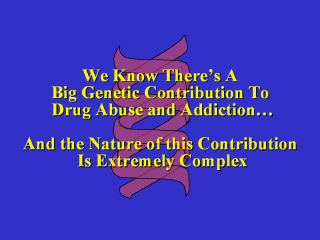Search inside of Supercourse and lectures in HTML and PPT format
 |
 |
front |1 |2 |3 |4 |5 |6 |7 |8 |9 |10 |11 |12 |13 |14 |15 |16 |17 |18 |19 |20 |21 |22 |23 |24 |25 |26 |27 |28 |29 |30 |31 |32 |33 |34 |35 |36 |37 |38 |39 |40 |review |
 Studies have shown that 40-60 percent of the predisposition to addiction can be attributed to genetics. This is not just the risk conveyed by genes themselves, but also the added impact of the environment on how those genes function or are expressed. Using drugs is the most influential environmental factor in altering a person’s vulnerability to addiction. Growing knowledge about the dynamic interactions of genes with the environment and developmental stage confirms addiction as a complex and chronic disease of the brain with many contributors to its expression in individuals. |
|